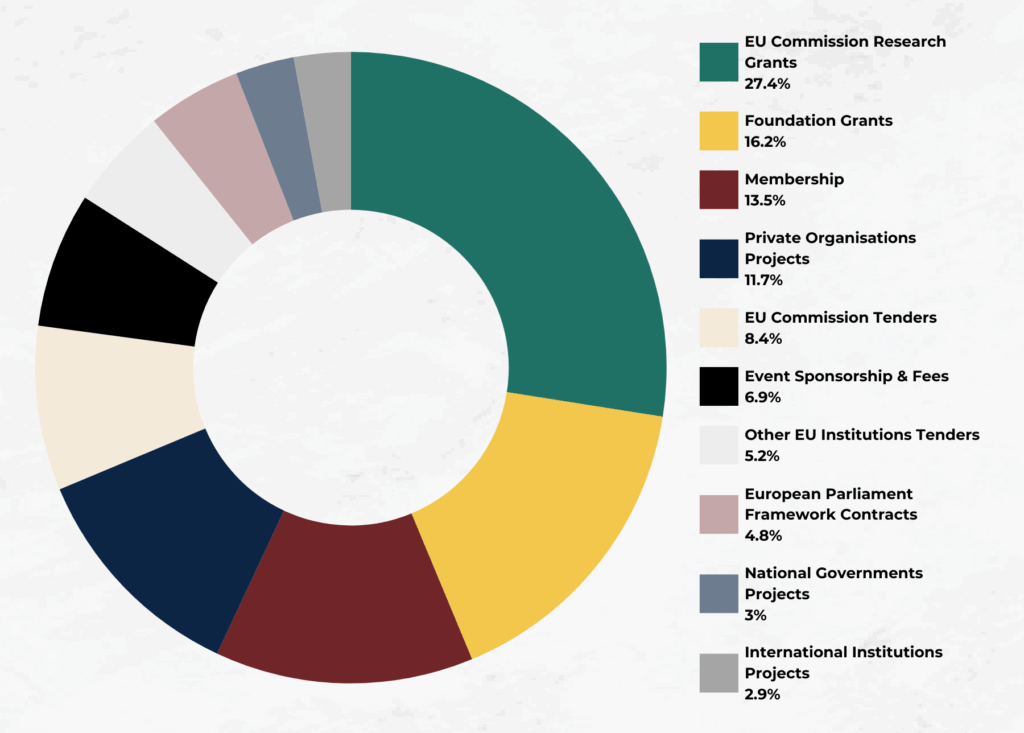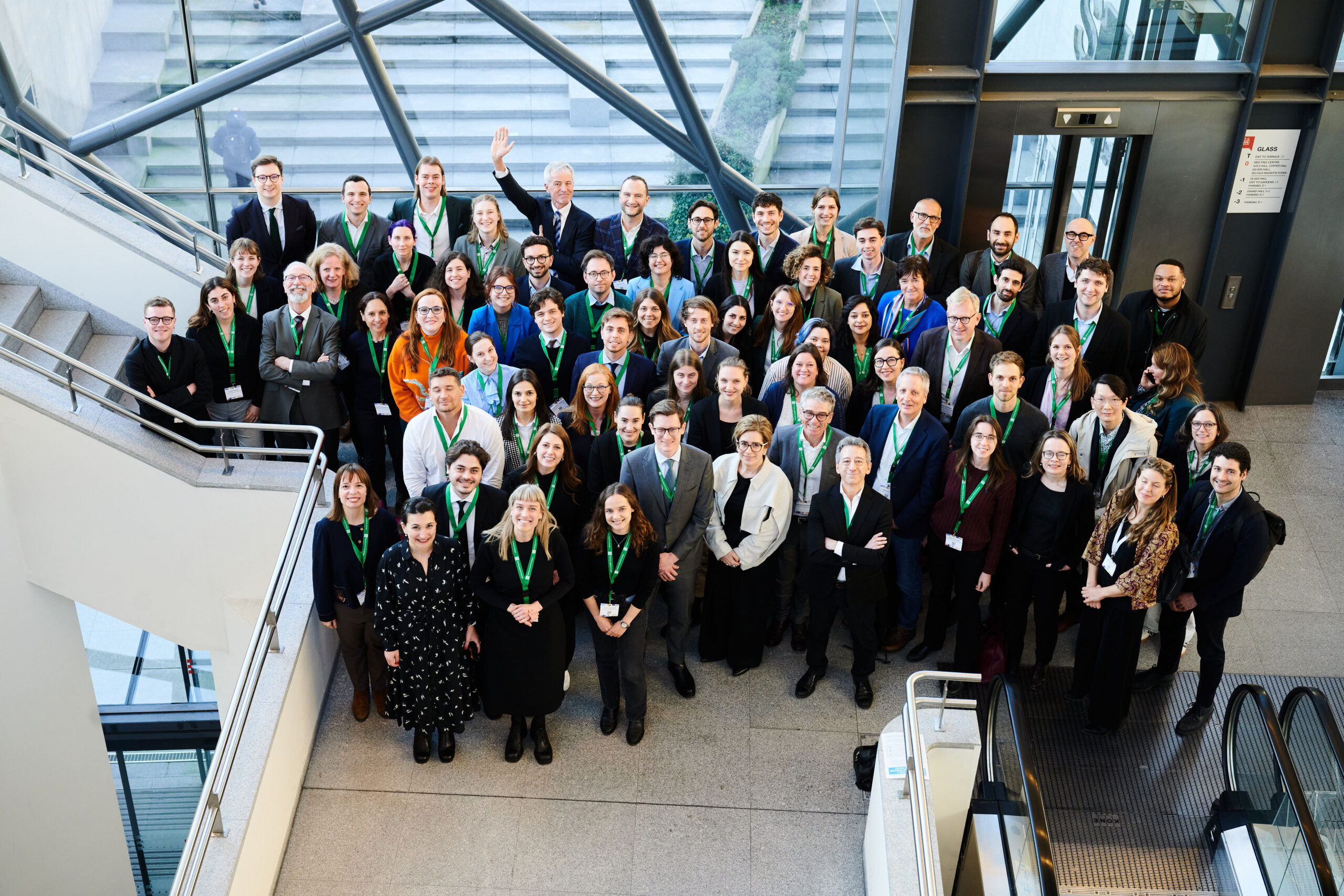Scary time for the EU,
but a busy year for CEPS
2025 turned out to be a very eventful year, sometimes concerning, so we’ve all been hoping for a calmer, more positive 2026 for the EU, Europe and the world. Alas, it appears that once again, 2026 will be another turbulent year.
More than ever, evidence-based independent policy research is needed in times of power politics and ideological warfare. Think thanks have a crucial role to play in these circumstances, to stay above the fray and to provide deep insights into thorny policy challenges.
Indeed, over the past year we’ve been highly active in some of the thorniest debates taking place in Brussels, from the Commission’s ongoing deregulation exercise in the sustainability agenda, the pressures on EU digital policies, and the renewed calls for a more unified EU capital market. We’ve done this through an impressive number of publications, which range from short, op-ed-style expert commentaries, through to longer, deeper in-depth analysis papers, as well as several high-level events with key stakeholders, and, of course, our flagship annual event, Ideas Lab.
Karel Lannoo
CEPS Chief Executive Officer
RESEARCH PRIORITIES
HIGHLIGHTS OF THE YEAR
THE YEAR IN PUBLICATIONS
THE YEAR IN EVENTS
the year in projects and task forces
CEPS IN THE POLICY DEBATE
- Andrea Renda delivered a keynote lecture for DG RTD on ‘quantum policymaking’. His work on this topic, combining foresight, multi-criteria policymaking and adaptive regulation, was explicitly mentioned by DG GROW in its new blueprint for industry policy released at the end of 2025.
- Sergio Carrera participated in a close-doors bilateral meeting between CEPS and PICUM with the European Commission’s Director of the Migration and Asylum department and the Head of the Return Unit to present and discuss the preliminary MORE project
- Irina Kustova spoke at the International Energy Policy Summit as part of a panel on ‘Decarbonisation as a driver of European integration’.
- Karel Lannoo spoke at ESMA’s 2025 conference ‘Shaping the future of EU capital markets’.
- Sergio Carrera gave a presentation on the panel ‘Implementation of the new measures and instruments’ at the European Parliament’s LIBE-PETI joint public hearing on ‘Border checks and the future of the Schengen area’.
- Beatriz Pozo presented the 2024 EU Payment Observatory Annual Report to an European Economic and Social Committee (EESC) Members meeting.
- Berta Mizsei participated in the by the EESC.
- Karel Lannoo spoke at Better Finance’s International Conference ‘Towards a Savings and Investment Union’.
- Karel Lannoo organised a ‘Chief Economists – Macro Group’ webinar, chaired by Erik F. Nielsen, Senior Advisor at Independent Economics and former Group Chief Economic Adviser at UniCredit. The Macro Group initiative aims to bring together chief economists and offer insights into Europe’s macroeconomic landscape. Karel also participated in two subsequent webinars in this series, which were organised in April and October 2025.
- Olesya Grabova, J. Scott Marcus, Pierre-Alexandre Balland and Robert Praas presented a study on generative AI to the EESC.
- Apostolos Thomadakis spoke at the 2025 EFFAS Capital Markets Forum, on the panel ‘The Capital Markets Union: is it still alive’.
- Cinzia Alcidi gave a keynote speech at POLITICO’s Public Affairs Forum, titled ‘As tensions increase with the Trump administration, where does the EU stand?’.
- Fanny Sauvignon participated in a closed-doors meeting organised by the OECD Development Assistance Committee to discuss global development cooperation and the Global Gateway.
- Karel Lannoo spoke at a high-level conference on EU capital markets organised by the Confederation of Swedish Enterprise.
- Vasileios Rizos participated in the International Workshop on Applied Economics and Sustainability, giving a presentation on a new framework for environmental policy instruments.
- Andrea Renda delivered a keynote speech on the creation of a network of national AI supervisors at UNESCO’s expert roundtable on AI for Competent Authorities.
- Apostolos Thomadakis presented the EP study ‘Reporting obligations’ during a JURI committee meeting at the European Parliament.
- Davide Monaco spoke on a panel on AI and the future of work at the 2025 EU-US Young Leaders Seminar organised by the German Marshall Fund of the United States.
- Judith Arnal participated in ACI Worldwide and The Paypers’ Summit and spoke during the session ‘The next frontier in fraud prevention’.
- Fanny Sauvignon spoke on the panel 2025 organised by the Anna Lindh Foundation.
- Louise Bengtsson participated in a roundtable at Almedalen Democratic Festival organised by the One Campaign.
- Raquel Jorge spoke at Euractiv’s Tech Policy Conference.
- Sergio Carrera and Davide Colombi participated in a workshop on ‘Local realities, European ambitions: integration and transnational engagement of the Afghanistani community in Brussels’, organised by CEPS and the Network of Afghanistani Diaspora Organisations in Europe.
- Andrea Renda and Pierre-Alexandre Balland presented their study on Sweden’s competitiveness to the Royal Institute of Technology in Stockholm as well as in private closed-door meetings with key stakeholders and policymakers.
- Apostolos Thomadakis spoke at the 2025 Sustainable Finance and Asset Management Conference organised by the Vlerick Sustainability Centre.
- Cinzia Alcidi gave a keynote speech on the ‘faltering global order in the age of geoeconomics’ at the annual IPE Infrastructure & Nature Capital Conference
- Laura Nurski gave a presentation on AI and the future of work to the World Employment Confederation’s Economic Affairs Committee.
- Patricia Urban presented CEPS’ research on sufficiency policy for buildings at the World Resources Forum.
- Tinatin Akhvlediani joined a panel on economic challenges and cooperation in the South Caucasus at the 108th Rose-Roth Seminar organised by the NATO Parliamentary Assembly.
- Andrea Renda became a Commissioner in the NUS PRIME Lancet Commission on pandemic preparedness and spoke at the World Health Summit in Berlin.
- Christian Dietz spoke on a panel organised by Sciences Po PSIA, CERU and KU Leuven, ‘Ten years after Paris: lessons learned and the road to 2030’.
- Cinzia Alcidi gave a keynote speech on ‘Global challenges in the age of geoeconomics’ at .
- Fredrik Andersson presented the CEPS In-Depth Analysis on the Swedish financial sector at the FSCI-COLC Financial Services Dialogue.
- Harry Crichton-Miller gave a presentation on trade-offs between competitiveness and social priorities at the UK Mission to the European Union.
- Karel Lannoo spoke at the 34th EuroFinance International Treasure Management conference on the panel ‘Finance infrastructure: the evolution of regulation and banking’.
- Ceren Ergenc and J. Scott Marcus presented CEPS’ study ‘The next steps for European economic security – lessons learned from Chinese Economic Coercion’ to the European Parliament’s ITRE committee.
- Cinzia Alcidi gave a keynote speech on the EU’s economic security at the Association of Independent Economic Research Institutes’ Autumn 2025 meeting.
- Davide Colombi spoke during a panel on implementing the EU Migration & Asylum Pact at the Cyprus Forum Brussels.
- Davide Monaco gave a presentation on a ‘’ to the Commission’s DG EMPL.
- Edoardo Righetti moderated a panel on ‘Certifications and standards as enablers for sustainable critical raw materials value chains’ during Raw Materials Week 2025 organised by the European Commission.
- Laura Nurski spoke on the panel ‘Future-proofing work: the role of job quality in supporting an engaged, adaptable, and resilient workforce’ at the Foundation Forum 2025, organised by Eurofound.
- Timothy Yeung presented the EPRS study ‘Europe’s Beating Cancer Plan: implementation findings’ to the European Parliament’s SANTE Committee.
- Apostolos Thomadakis spoke at a High-Level Conference on the 28th European company regiment organised by the Permanent Representation of France to the EU.
- Tinatin Akhvlediani took part in a field mission to Ukraine organised by the German-Ukrainian Bureau with the support of the German Federal Foreign Office. She joined a distinguished expert group to better understand the realities on the ground regarding Ukraine’s EU accessions prospects.
- Vasileios Rizos spoke at the event ‘Can a fully-fledged EU circular economy model foster resilience, competitiveness and innovation in the European economy?’ organised by PubAffairs Bruxelles.
Financial Overview
CEPS’ revenues come from a wide variety of sources, which is fundamental to ensuring our independence. Just over 40% of our net income originates from calls for tenders and grants from the EU institutions. This figures includes activities from six H2020 projects, 17 Horizon Europe projects, and various DGs & Committees within the European Commission and Parliament, and other EU agencies.
In line with our strategic agenda we have increased the income coming from foundation funded projects to 16%. We received a further 14% from membership fees that include a diverse group of corporations and institutions.
The remaining income was generated through projects with private organisations (10%), international institutions (3%), national governments (3%) as well as through the organisation of events, such as the Ideas Lab. This breakdown does not include revenue earmarked for CEPS’ various project partners.

CEPS Membership
Our membership network comprises approximately 160 members from industry, institutions and associations across diverse sectors and location. At CEPS, we greatly value this broad membership base as it serves multiple vital purposes. Not only does it bolster our mission to ‘think ahead for Europe’ and helps to uphold our independence, but it also enables us to stay attuned to Europe’s ever-evolving landscape. Additionally, our members act as invaluable sounding boards, essential for testing the feasibility of our policy recommendations.
By joining CEPS, members lend their support to our pursuit of independent and high-quality research that significantly contributes to shaping policy dialogues at both the European and global levels. In return, our members gain exclusive opportunities. These include direct interaction with EU decision-makers in a multitude of settings, both formal and informal. Members participate in well-informed and balanced discussions concerning European affairs, enabling them to access expert insights into political issues and legislative proposals.
KNOWLEDGE
Deepen your insights of current and future policy implications by accessing briefings from CEPS researchers. You will also have access to our members-only insights exclusive summaries outlining the main context, takeaways and other relevant information from our latest publications.
rESOURCES
Learn and exchange views on the most important EU policy developments by being part of CEPS Task Forces and CEPS’ main annual event, Ideas Lab.
NETWORK
Expand the visibility of your organisation by engaging with the CEPS network. CEPS hosts regular gatherings of its corporate and institutional members representing industry, regulators, institutions, associations, and academia.
EVENTS
Engage in thought-provoking discussions with diverse stakeholders while taking advantage of complimentary access to CEPS Ideas Lab, exclusive thematic roundtable sessions, high-profile speaker events, expert briefings, and members-only webinars.
NEWS
Receive a weekly member newsletter for important updates on research and publications. Be among the first to learn about the latest policy developments.
PLATFORM
Use a neutral platform to co-host special events with CEPS, ensuring a well-informed and balanced discussion. You also can commission independent research on a topic of joint interest.
Corporate Membership
Corporate Membership
Associations and Foundations Membership
Corporate Membership
Institutional Membership
Corporate Membership

About CEPS
The Centre for European Policy Studies (CEPS) stands as a preeminent think tank and a prominent forum facilitating discussions on EU affairs. Our institution boasts an unparalleled in-house research capacity, couple with an expansive network of partner institutes.
We serve as an impartial platform, fostering dialogues and proffering viable solutions for EU policymaking. This is accomplished through a spectrum of initiatives, including research projects, the publication of findings, the facilitation of task forces, and the organization of regular events and workshops.
At CEPS, our researchers are distinguished experts who offer profound insights and astute policy analysis spanning a wide spectrum of areas. These encompass economic and financial matters, strategies for enhanced regulation, the burgeoning digital economy, trade policies, energy and climate-related issues, as well as the complex domain of foreign policy, among others. Through our multifaceted approach, we endeavour to contribute significantly to the development of well-informed and effective policies in the European Union and beyond.
